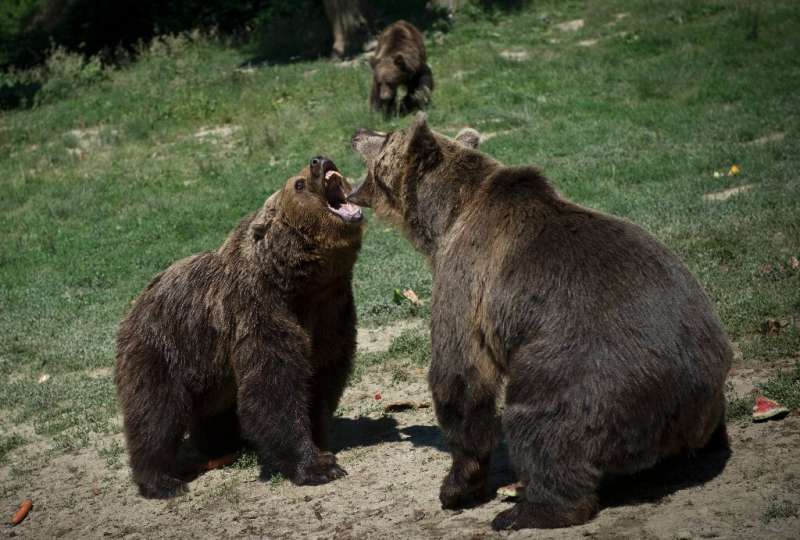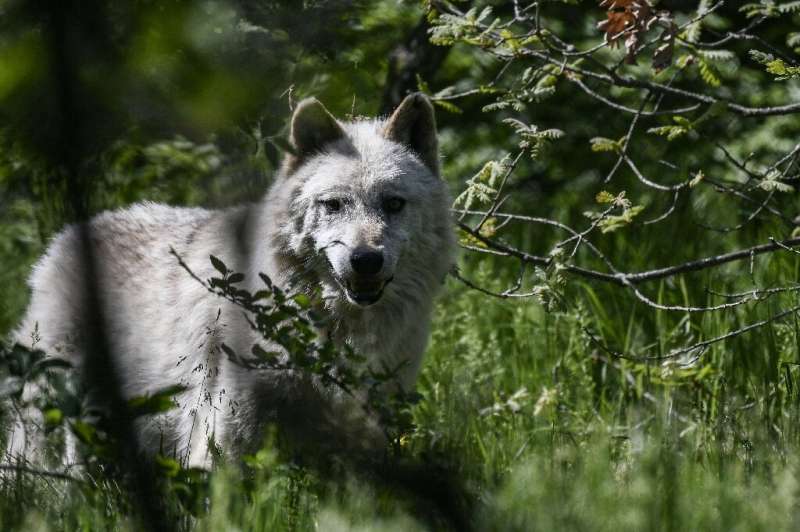Europe's wildlife sanctuaries struggle under virus lockdown

In a bear sanctuary in Romania's Carpathian Mountains, chestnut-gold Lidia and her dark brown companion Jean enjoy a welcome respite from human presence inside the world's largest brown bear sanctuary.
The bears may well appreciate the tranquility—but their minders are significantly more concerned by lost income since the sanctuary has been closed for weeks under coronavirus lockdown regulations.
"Tickets and souvenirs represented around a third of our annual revenue," said Cristina Lapis, the founder and president of the AMP (Millions of Friends) organisation that runs the Libearty sanctuary.
The hardship has become commonplace at sanctuaries and zoos across Europe that have been hammered by coronavirus quarantine measures.
The 69-hectare (171-acre) park in the Transylvanian town of Zarnesti is home to over 100 bears freed from captivity.
The business of keeping them fed is not cheap.
"Bears need two tonnes of food each day," she told AFP.
"We can manage for a month, hoping that the lockdown will end in early May so we can resume accepting visitors," Lapis said.
In Tirana, staff at the city zoo are working round the clock to feed the animals, which include four bears, manager Luli Shehaj told AFP.
Shutdowns enforced by countries across Europe last month come at the worst possible time for bears, as the animals were just awakening from their winter slumber.

'Economic shock'
For the Arcturos sanctuary in northern Greece, the lockdown was "an economic shock", said organisation spokesman Panos Stefanou.
The wildlife group currently cares for 24 bears, 12 wolves, 25 sheepdogs and a deer near Mount Vitsi, some 600 kilometres (350 miles) northwest of Athens, and was counting on thousands of monthly visits starting March.
"(Our monetary reserves) can hold out until the end of April," he said.
Arcturos faces a monthly bill of 43,000 euros ($46,000), including 12,000 euros to feed the animals, he added.
Two of the animals—a male bear and a she-wolf—are injured and in need of additional care.
A call for help on March 26 helped cover expenses for two weeks.
"We will launch another appeal to donors and sponsors," Stefanou said.
But if the lockdown continues to the end of May, the group will sustain an economic hit of 180,000 euros, he added.
Arcturos runs awareness campaigns, veterinary care and wildlife reintegration. It shelters bears and wolves mainly from the Balkans but has also taken large predators from as far away as Austria and Georgia.
Wild fauna has also capitalised on humanity's mass retreat indoors.

In Tel Aviv last week, dozens of jackals took over a deserted park in Tel Aviv, scavenging for food in what is usually a playground for joggers and families.
In the northern lake city of Kastoria earlier this month, a bear and her three cubs took advantage of the coronavirus lockdown in by strolling along the normally busy shore.
In Spain, the unfamiliar lull in traffic has led to spottings of roe deer, boar, monk vultures and Eurasian eagle-owls.
"We have observed changes in some species due to confinement. We have observed it especially in forest species," said Miguel Higueras, head of the Madrid regional forestry agency.
"For example, roe deer are rarely seen outside forests. Now we see them near urban centres and highways," he said.
'We took this land'
The Wild Animals foundation in Sofia, which cares for smaller wild animals found wounded, points out that urban areas "are territories which we should not forget we took from nature".
The Bulgarian group has warned the public not to feed wild animals, merely to evaluate whether they are injured and may require assistance.
"A wild animal's life is a difficult one, there is no need to make it more complicated," they noted.
"Wild animals have to stay away from people, it is for their own good."
If everything appears to be normal, admire the animal from a distance and then walk away," the group said.
© 2020 AFP




















